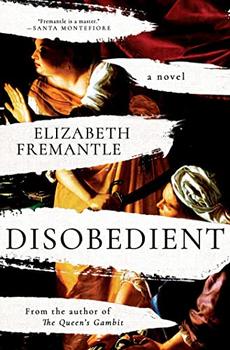Summary | Excerpt | Reviews | Beyond the book | Read-Alikes | Genres & Themes | Author Bio

A Novel
by Emily HowesPeggy and Molly Gainsborough are sisters and best friends, living an idyllic life in 18th-century Ipswich where they explore the countryside with their artist father. But Molly isn't well—she has episodes of confusion and dissociation, forgetting where she is or what she's doing. Even worse, at times she speaks or behaves irrationally. Peggy is desperate to help her sister, doing her best to hide or explain away these moments. This is difficult enough, but when their parents move the family to Bath for the sake of their father's career, it becomes even harder. The Painter's Daughters follows Peggy's journey to adulthood as she struggles with her fear for and anger at her sister, as well as finding her place in the world.
The characters and their relationships are the highlight of the novel. Howes expertly crafts characters that are both deeply flawed and easy to empathize with. One of Peggy's greatest strengths—her devotion to her sister—proves to also be one of her greatest failings, as her attempts to protect Molly also stifle her. Despite her love, Peggy often feels deeply resentful of her sister and the burden that has been placed on her by Molly's illness and their parents' denial of it. More and more over the course of the book, she disregards Molly's thoughts and feelings in favor of what she believes to be best.
The girls' relationships with their parents are similarly complex. Their mother's ambition for her daughters is smothering—from the very beginning of the book where she insists they must begin to learn proper conduct while their father begs that they be allowed to remain children for longer. Despite coming from a place of love, her restrictions harm her daughters. For instance, despite being the one to manage the family's finances and keep them afloat, she refuses to teach Molly and Peggy how to do the same, because she wants them to marry into positions where that would be unnecessary.
Their father, by contrast, is indulgent and fun-loving. But as she grows, Peggy understands more and more how his lack of forethought puts them at risk, and his refusal to acknowledge their problems means she cannot rely on him. He has a string of affairs that are Peggy's first exposure to sex and sexuality, and there is a stark contrast between his treatment of his daughters and of his nephew, who becomes his apprentice. The combination of these factors leaves Peggy desperate for him to pay attention to her and take her seriously.
Throughout the book, the central characters are unable to escape the fact that they live in a deeply misogynistic society. Over and over, it is shown that there are very different standards for men and women, from men's casual attitudes towards affairs while the same destroy women's lives, to Peggy's father trivializing his daughters' attempts to learn art while seriously teaching his nephew. Peggy often compares herself to the portraits her father paints of them, feeling simultaneously compelled to live up to their perfection, and reduced to an image instead of a person.
Howes' debut is hard to put down once you've started, but unsurprisingly emotionally heavy, given the difficult issues it grapples with. I cannot recommend it enough for readers looking for a nuanced, character-driven story. Between the vivid depictions of 18th-century English society and heartwrenching family dynamics, it would also provide ample material for rich book club discussions.
![]() This review was originally published in The BookBrowse Review in March 2024, and has been updated for the
March 2025 edition.
Click here to go to this issue.
This review was originally published in The BookBrowse Review in March 2024, and has been updated for the
March 2025 edition.
Click here to go to this issue.

If you liked The Painter's Daughters, try these:

by Sarah Perry
Published 2025
A dazzling new work of literary fiction from the author of The Essex Serpent, a story of love and astronomy told over the course of twenty years through the lives of two improbable best friends.

by Elizabeth Fremantle
Published 2023
A riveting novel based on the life of Artemisia Gentileschi—the greatest female painter of the Renaissance—as she forges her own destiny in a world dominated by the will of men.
Your guide toexceptional books
BookBrowse seeks out and recommends the best in contemporary fiction and nonfiction—books that not only engage and entertain but also deepen our understanding of ourselves and the world around us.